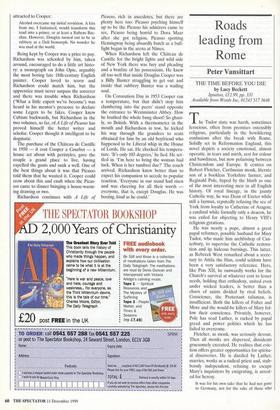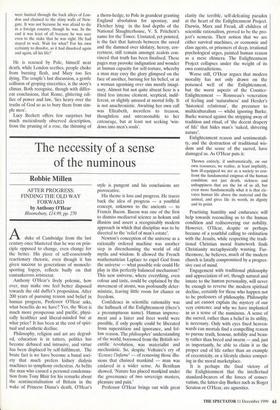Roads leading from Rome
Peter Vansittart THE TIME BEFORE YOU DIE by Lucy Beckett Ignatius, £12.99, pp. 331 Available from Words Inc, 01243 517 3648 The Tudor state was harsh, sometimes ferocious, often from premises ostensibly religious, particularly in the bewildering confusions after the break with Rome. Solidly set in Reformation England, this novel depicts a society emotional, almost operatic, in tears and mirth, zest for colour and bawdiness, but now polarising between Christendom and Europe. It centres on Robert Fletcher, Carthusian monk, literate son of a booldess Yorkshire farmer, and Reginald Pole, hyped by the blurb as one of the most interesting men in all English history. Of royal lineage, in the jaunty Catholic way, he was Dean of Exeter while still a layman, reputedly refusing the see of York from loyalty to Catherine of Aragon; a cardinal while formally only a deacon, he was exiled for objecting to Henry VIII's religious gyrations.
He was nearly a pope, almost a great papal reformer, possible husband for Mary Tudor, who made him archbishop of Can- terbury, to supervise the Catholic restora- tion and kt,s hideous burnings. This latter, as Rebecca West remarked about a secre- tary to Attila the Hun, could seldom have been a very satisfactory reference. Here, like Pius XII, he outwardly works for the Church's survival at whatever cost to lesser needs, holding that orthodoxy, united even under wicked leaders, is better than a chaos of saints divided by rival beliefs. Conscience, the Protestant talisman, is insufficient. Both the killers of Fisher and More and the would-be killers of Mary fol- low their conscience. Privately, however, Pole has read Luther, is racked by papal greed and power politics which he has failed to overcome.
Fletcher, as monk, was seriously devout. Then all monks are dispersed, dissidents gruesomely executed. He realises that evic- tion offers greater opportunities for spiritu- al discoveries. He is dazzled by Luther, marries, works as a radical priest and, stub- bornly independent, refusing to escape Mary's inquisitors by emigrating, is arrest- ed for heresy.
It was for his own sake that he had not gone to Germany, not for the sake of those who
were hunted through the back alleys of Lon- don and chained to the slimy walls of New- gate. It was not because he was afraid to die in a foreign country, though he was. In the end it was least of all because he was sure even to the stake that he was right. He had stayed to wait. Wait for what? For his own certainty to dissolve, as it had dissolved again and again, all his life?
He is rescued by Pole, himself near death, while London seethes, people choke from burning flesh, and Mary too lies dying. The couple's last discussion, a gentle collision of groping sincerities, is the story's climax. Both recognise, though with differ- ent conclusions, that Rome, glittering edi- fice of power and law, 'lies heavy over the truths of God so as to bury them from sim- ple men'.
Lucy Beckett offers few surprises but much meticulously observed description, from the pruning of a rose, the thinning of a thorn-hedge, to Pole in grandeur granting England absolution for apostasy, and Fletcher lying in the foul depths of the National Slaughterhouse, V. S. Pritchett's name for the Tower. Unstated, yet pointed, is the fact that hatreds between the saved and the damned over idolatry, heresy, cor- rectness, still remain amongst zealots con- vinced that truth has been finalised. These pages may provoke indignation and wonder at human capacity for self-torture, whereby a man may envy the glory glimpsed on the face of another, burning for his belief, or at a woman agonising over sins mostly imagi- nary. Almost but not quite absent here is a third less intense element, sceptical, indif- ferent, or slightly amused at mortal folly. It is not anachronistic. Awaiting her own call was Elizabeth, merciless to treason, thoughtless and unreasonable to her entourage, but at least not seeking 'win- dows into men's souls'.



























































































 Previous page
Previous page